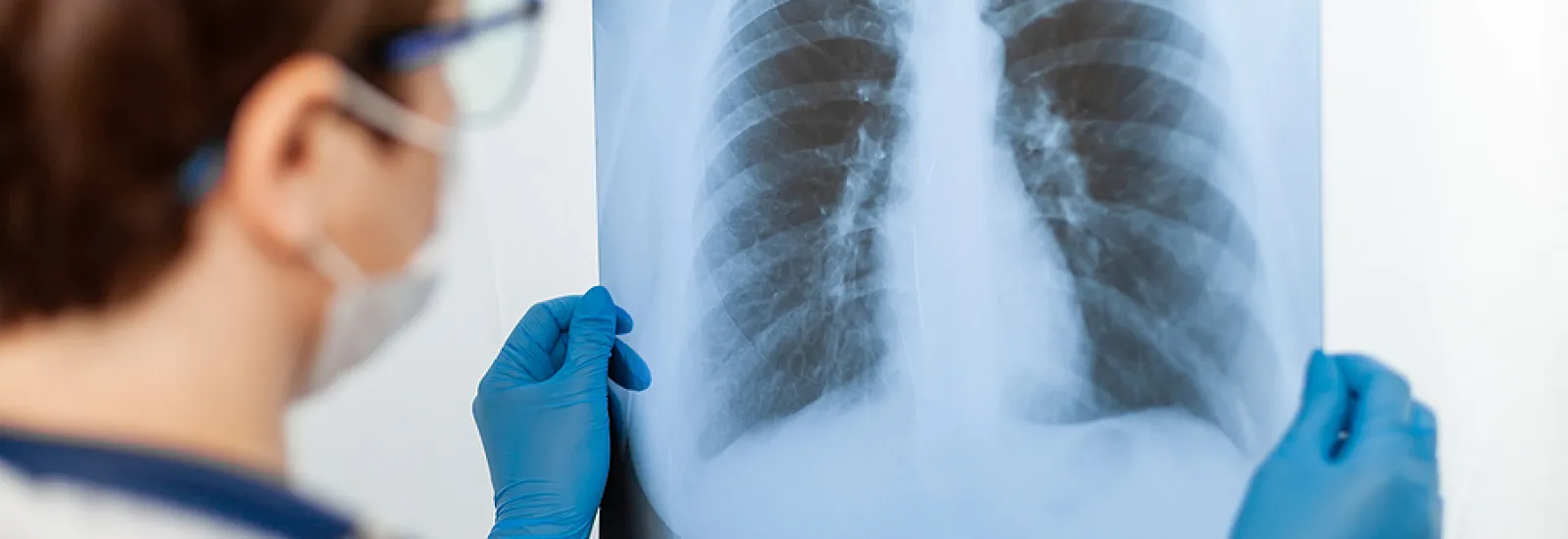
What Are the Symptoms of Pneumonia?
Pneumonia is an infection of the lungs that causes cough, fever and
trouble breathing, among other symptoms. Although you may think it is something
you could never get, pneumonia is one of the leading causes of hospitalizations in
America. Approximately one million American adults seek hospital care every
year due to pneumonia. Prompt treatment of pneumonia can mean the difference
between requiring hospitalization or recovering at home.
This FAQ will help you recognize the signs and symptoms of pneumonia,
available treatment options and ways to keep yourself and others healthy.
What causes pneumonia?
Pneumonia is an infection of the lungs caused by viruses, bacteria,
fungi and parasites. A person who becomes ill with a cold, the flu, bacterial
or other infection can develop pneumonia as a secondary illness. Pneumonia is
more common from autumn through spring because there are more cases of cold and
flu during this time.
Who gets pneumonia?
Anyone can get pneumonia, but some populations are at greater risk
including people with chronic conditions like asthma, individuals with heart
and lung disorders, premature infants, the elderly and people with compromised
immune systems.
What does pneumonia feel like?
Not everyone feels the same when they have pneumonia, but there are
core signs you can look out for, such as feeling like you're out of breath,
generally feeling tired or sleepy and sharp, stabbing chest pain. Note, however,
that "walking pneumonia" might not have obvious symptoms or just
symptoms of a common cold.
Signs and Symptoms of Pneumonia
- Pain or tightness in
the chest that worsens with coughing or breathing
- Cough with phlegm
- Feeling suddenly worse
after having a cold or the flu
- High fever
- Nausea
- Diarrhea
- Shaking chills
- Shortness of breath
- Vomiting
These are just some of the most common symptoms experienced by
patients.
What are the signs of pneumonia in children?
When children have pneumonia, they can experience the same symptoms as
adults including high fever, cough, difficulty breathing and pain in the chest,
but they may also complain of stomach pain, ear pain, have a decreased appetite
and be more tired or irritable than usual. If a child has "walking
pneumonia" their symptoms may be milder and can appear like a cold. Some
infants may not appear to have any symptoms beyond being restless and a
decreased appetite. In extreme cases of pneumonia, infants and small children
may have bluish fingernails, toenails, lips and mouth.
What are the symptoms of pneumonia in the elderly?
The elderly typically experience fever, chills, chest pain and
difficulty breathing, but symptoms may be mild. When older adults have
pneumonia, they are more likely to be confused, dizzy or have sudden changes in
mental awareness.
Do you run a fever with pneumonia?
In both viral and bacterial pneumonia, a fever is often present. It is
not, however, a "requirement." In rare cases, it is possible to have the
illness without running an obvious fever, such as with infants and older adults
with naturally low body temperatures.
Does pneumonia cause chest pain?
Chest pain is one of the most common symptoms of pneumonia. Chest pain
is caused by the membranes in the lungs filling with fluid. This creates pain
that can feel like a heaviness or stabbing sensation and usually worsens with
coughing, breathing or laughing.
Does pneumonia cause vomiting?
Though not a classic symptom of pneumonia, vomiting can occur due to
nausea. Nausea or dizziness is a more common symptom of pneumonia, which can
sometimes lead to vomiting.
How do you treat pneumonia?
Treatment for pneumonia depends on the cause. If pneumonia is caused by
a bacterial infection, antibiotics will be prescribed to kill the harmful
bacteria. If pneumonia is caused by a viral infection, time and rest
are best for recovery. Fever reducing medications and cough medications
can help relieve symptoms and aid sleep.
How can I prevent pneumonia?
- Practice good
hygiene. Wash your hands, distance yourself from people who are
ill, cough into your mouth and refrain from touching your eyes, mouth and
nose. Following the same recommendations to reduce flu risk can also
reduce the risk of developing pneumonia.
- Get a flu shot. The
flu shot is a safe and effective way to prevent the flu. Since the flu is
one cause of pneumonia, a flu shot can prevent you from getting the flu
and minimize your risk of pneumonia
- Get a pneumococcal
vaccine. A pneumococcal vaccine cannot protect you from all
causes of pneumonia, but it can minimize your risk of developing pneumonia
from the most common strains. There are vaccinations developed for
specific age groups. The Centers for
Disease Control recommends the following routine pneumonia
vaccinations:
Pneumococcal conjugate vaccination for:
- All babies and
children younger than 2 years old
- People 2 years or
older with certain medical conditions
Pneumococcal polysaccharide vaccination for:
- All adults 65 years or
older
- People 2 through 64
years old with certain medical conditions
- Adults 19 through 64
years old who smoke cigarettes
If you have been experiencing pneumonia symptoms, make an appointment
with your provider today. Prompt treatment of pneumonia is
important for recovery. Request
an appointment with a family medicine provider to receive your flu and
pneumococcal vaccinations.

